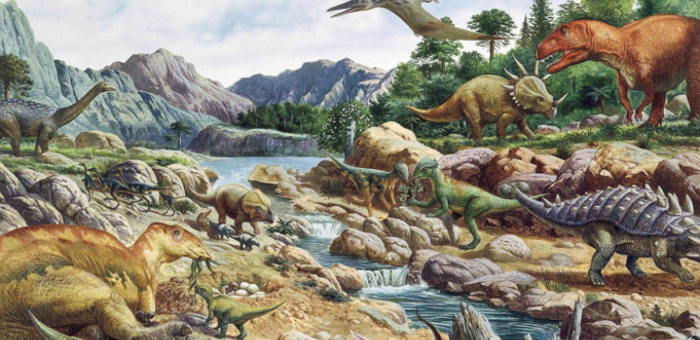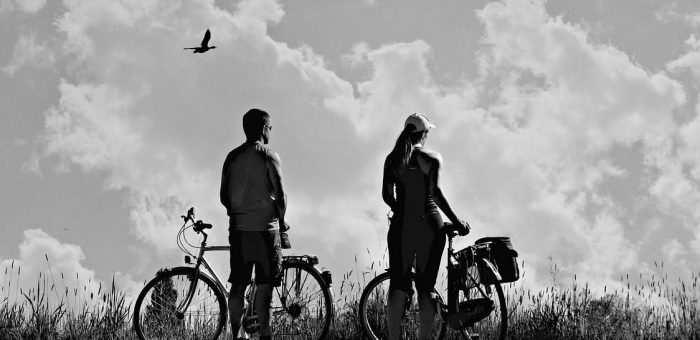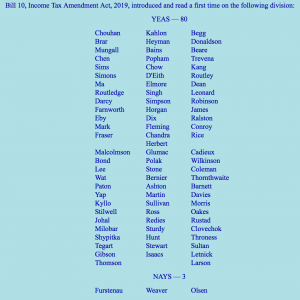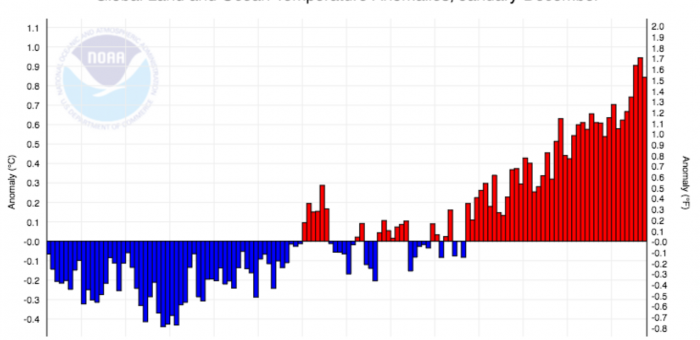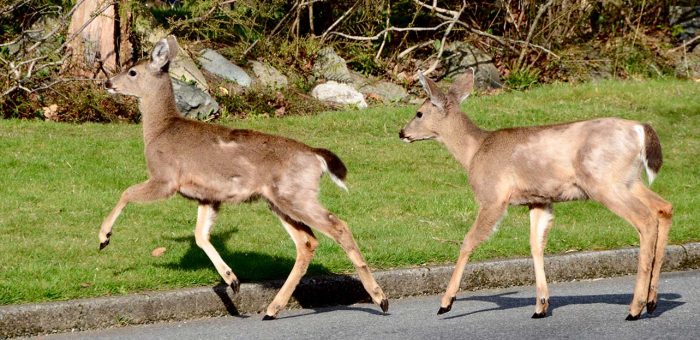Environment
Widespread species extinction from fossil fuel combustion
Today in the BC Legislature I rose to give a Members’ Statement on global warming and species extinction. Having had to sit through an excruciatingly painful week watching the hypocrisy of BC NDP MLA after BC NDP MLA standing up and voting against everything they believe in (because they were whipped into doing so), I thought I would remind the house what’s at stake if we don’t start to reduce greenhouse gas emissions immediately.
As I articulate in my statement, by the time the warming reaches 2°C later this century, 99% of all the world’s coral reef species will be extinct.
Below I reproduce the video and text of my statement.
Video of Statement
Text of Statement
A. Weaver: Since the beginning of the Paleozoic, there have been six great extinctions. The first occurred 440 million years ago, and 80 to 85 percent of known marine species were wiped out. And 360 million years ago 80 to 85 percent of known marine species were once more obliterated.
At the boundary of the Paleozoic and Mesozoic, 251 million years ago, 70 percent of all land species and 96 percent of all marine species were eradicated. At the boundary between the Jurassic and Triassic, some 200 million to 210 million years ago, 80 percent of marine species and many of the land vertebrates perished, including most amphibians.
In the fifth, known as the Cretaceous–Tertiary or K–T event, 75 percent of world species, including the dinosaurs, were wiped out.
The sixth and greatest extinction event in the history of the earth is occurring as I speak. This extinction event is unique in that it is a direct consequence of human activity.
In all cases, marine extinctions and increases in ocean acidity go hand in hand. Whether it be flood basalt eruptions spewing enormous quantities of carbon dioxide and sulfates into the atmosphere for hundreds of thousands of years, a global sulfate dust cloud formed when a meteor landed in a gypsum deposit in the Yucatán Peninsula or carbon dioxide released by humans in the combustion of fossil fuels, the effects are identical. Eventually, the ocean, slowly but surely, draws down the resulting carbon dioxide levels or, more rapidly, the sulfur levels, increasing the acidity of the surface waters.
When ocean surface acidity increases, creatures find it more and more difficult to create their calcium carbonate shells. In fact, their shells start to dissolve.
It took at least two million years before coral started to reappear and about ten million years for their genetic diversity to become re-established after the KT extinction event. Children born today will be the last generation to witness the majestic beauty of coral reef biodiversity, for the world’s coral reef systems are on the fast track to global extinction. We know that by the time the warming reaches 2 degrees later this century, 99 percent of all the world’s coral reef species will be extinct. You can take that one to the bank, hon. Speaker.
In the words of Greta Thunberg:
“our civilization is being sacrificed for the opportunity of a very small number of people to continue making enormous amounts of money. It is the sufferings of the many which pay for the luxuries of a few. You say you love your children above all else, yet you are stealing their future in front of their very eyes.“
Active transportation input invited from public
Public input is sought as part of the BC Government’s ongoing community consultation on active transportation. This is an important part of the work done by the BC Green Caucus for the CleanBC initiative. Started on March 1, 2019, a new online question will be posted every two weeks. The online engagement will be open until April 15, 2019 at 4pm. Feedback received will result in a report that will be made publicly available.
This province-wide consultation is an opportunity for British Columbians to provide input into ways to make our communities more livable, with CleanBC investments that will change how we work, live and get around. The input received on active transportation will assist in providing a provincial framework to advance active transportation throughout the province.
There are several ways you can participate in the conversation about active transportation until April 15. In addition to the online discussion forum about active transportation, you can submit your comments by email to activetransportation@gov.bc.ca
A formal stakeholder submission, with established criteria and guidelines, is also underway.
You can find out more and how you can participate at CleanBC Active Transportation.
I hope you will join in this conversation and other opportunities to participate and give feedback on topics related to CleanBC. Regular updates are also available to those who wish to receive them.
Ongoing generational sellout continues as BC NDP doles out new tax credits in quest to entice LNG Canada
Today the BC NDP introduced Bill 10, Income Tax Amendment Act, 2019. If enacted, this bill would repeal the LNG Income Tax Act as amended in April 2015, as well as the Liquefied Natural Gas Project Agreements Act. The bill also creates yet another tax credit for the natural gas sector.
So while the BC Government continues to claim it is taking steps to aggressively reduce greenhouse gas emissions, they are making plans to add the single biggest point source of such emissions in Canadian history. It’s time politicians level with British Columbians about the economic and environmental consequences of this historical betrayal of future generations.
Below I reproduce the press release that my colleagues and I released. We also voted against the introduction of the bill at first reading (vote also reproduced as well).
Media Release
LNG legislation antithetical to government’s commitment to CleanBC, innovative economic vision
For immediate release
March 25, 2019
VICTORIA, B.C. With its introduction of LNG legislation today, government is now officially pulling the province in two different directions in its fight against climate change.
“Continuing to push for LNG development is short-sighted and works directly against CleanBC objectives,” said Dr. Andrew Weaver, leader of the B.C. Greens and lead author of four United Nations Intergovernmental Panel on Climate Change reports. “After years of criticizing the BC Liberals for their generous giveaway of our natural gas resources, the BC NDP have taken the giveaway to a whole new level. The legislation brought forward by this government is a generational sellout.
“We have only identified a pathway to take us only 75 percent of our 2030 emissions goals, yet we know that LNG Canada will emit an additional 3.45 megatonnes of greenhouse gases every year within our province alone, contributing massively to this gap. Government is demonstrating hypocrisy by supporting both LNG and CleanBC. They want to have their cake and eat it, too.
“We must adapt to the 21st century economy by investing in renewable energy infrastructure and transforming our province into a destination for innovative industries to thrive. Truly implementing CleanBC provides one such path for a carbon-neutral economy, one in which British Columbians are free from fossil fuels not just as an energy source, but in their jobs and everyday lives.
“The International Renewable Energy Association recently reported that there are over 10 million jobs in renewable energy. At the 2016 United Nations Climate Change Conference, 48 countries have agree to make 100 percent of their energy production renewable by the year 2050. The rest of the world is moving into the future while this government is tethering us to the past.”
MLA Sonia Furstenau is the caucus spokesperson for the environment.
“Communities are already facing significant impacts from climate change,” said Furstenau. “Whether it’s wildfires, floods, drought, species’ extinction, or crop failures, BC’s communities are at the frontlines of this fight. Pursuing LNG is tying our communities to an industry that is contributing to these challenges, while failing to invest in a sustainable, low carbon future.”
“Just last week over a million students – including a few thousand on the steps of the BC legislature – called for their governments to act on climate now,” added MLA Adam Olsen. “The legislation tabled today is the exact opposite of the action that our youth need from us. Climate change is happening now and we have a responsibility to take action.”
The BC Green caucus remains committed to implementing CleanBC’s vision sustainable economic vision.
“BC Green caucus will be voting against this legislation every step of the way,” Weaver said. “In minority governments, there are disagreements between partners. This is one of those. We will use our opportunities to speak to make our case to the 84 other legislators that LNG is the wrong path to pursue. BC Green caucus will not allow this legislation to deter it from continuing to contribute to this government in the historical, meaningful ways it has already on so many fronts: CleanBC, campaign finance reform, environmental assessment reform, professional reliance reform, funding for wild salmon, student debt and childcare relief.
“Unfortunately, with this legislation, we allow LNG Canada to make history for all the wrong reasons: it may be the single largest point source of carbon emissions in the country’s history,” said Weaver. “Is this what we really want our province to be known for?”
-30-
Media contact
Macon McGinley, Press Secretary
+1 250-882-6187 |macon.mcginley@leg.bc.ca
Statement on the School Strike for Climate
Today at the BC Legislature I had the distinct honour to witness more than a thousand youth support Nobel Peace Prize Nominee Greta Thunberg and the school climate strike. Below I reproduce the press release that the BC Green Party released in support of this event that I attended. As you might imagine, the incredible youth participating in this student strike are a wonderful inspiration for me and they certainly serve as hope for the future.
Media Release
B.C. Green Caucus statement on the School Strike for Climate
For immediate release
March 15, 2019
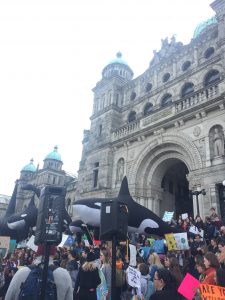 VICTORIA, B.C. – Inspired by the school strikes of Nobel Peace Prize Nominee Greta Thunberg, hundreds of thousands of children and youth around the world are striking today for climate action.
VICTORIA, B.C. – Inspired by the school strikes of Nobel Peace Prize Nominee Greta Thunberg, hundreds of thousands of children and youth around the world are striking today for climate action.
“Our children are telling us that it is time to treat this crisis as a crisis, and they are right,” said Andrew Weaver, leader of the B.C. Greens. “I am humbled and honoured to stand with the world’s children and youth as they demand political action on climate change.
“All of the science is pointing to the fact that we are fast running out of time to avoid global catastrophe, and yet around the world political leaders are failing to consider the existential threat that we face. To quote Greta Thunberg, we need to focus on what needs to be done rather than what is politically possible.”
“The decisions we make today have lasting impacts,” said Sonia Furstenau, B.C. Green MLA for Cowichan Valley. “Our young people may not be able to vote, but their voices are strong and we have a moral, ethical, and political responsibility to listen to them.
“We are incredibly proud of the CleanBC plan and how it will shape our province in the years to come. But as our children are pointing out today, we need to do much, much more. I was grateful to join today’s climate strike, these kids and young people inspire me to keep fighting for a just future.”
-30-
Media contact
Macon McGinley, Press Secretary
+1 250-882-6187 |macon.mcginley@leg.bc.ca
Celebrating the SPCA Wild Animal Rehabilitation Centre
Tonight I had the distinct honour of providing the opening remarks at the BC SPCA Spring into Wildlife celebration of the Wild Animal Rehabilitation Centre (Wild ARC). I took this opportunity to explore the innovative work being done by the District of Oak Bay, in partnership with the Urban Deer Stewardship Society and the Province of British Columbia, to introduce an evidence-based approach to urban deer management.
Below I reproduce the text of my remarks.
Text of my Remarks
Thank you for inviting me to attend this evening of celebration of the work of BC SPCA’s wild animal rehabilitation centre, as well as for providing me with the opportunity to offer some remarks about urban wildlife.
As the MLA for Oak Bay-Gordon Head, I often hear from constituents and community groups about the urban deer population. To address the situation properly we have to look at the root causes.
Human development has, over time, increasingly destroyed the deer’s natural habitat. In addition, their new habitat in our neighbourhoods removes many of their natural predators. As a result the local deer population has increased substantially. What was once a novelty to see is now an everyday occurrence.
It’s rare if we don’t see groups of deer as we walk, bike or drive around town. When we see one deer cross the road, we are extra vigilant for others, especially the fawns and yearlings usually following close behind.
The species of urban deer common in our area is the Columbian Black-tailed Deer. These deer are native to North America and have adapted to a variety of ecosystems over thousands of years. They have managed to adapt to our urban habitat and continue to share our beautiful, green urban landscape.
I am a big supporter of the District of Oak Bay’s approach to deer management through their plan for a contraception program. Oak Bay Council first adopted this approach in late 2016 and I worked with council to ensure they had access to provincial resources to initiate it.
What resulted was a three-way partnership between Oak Bay, the Province of BC and the non-profit Urban Wildlife Stewardship Society (UWSS). The Province provided the partnership with cost shared funding to research and test non-lethal, evidence-based methods of reducing the urban deer population.
UWSS operates under a provincial wildlife permit, which can only be granted if the project meets stringent animal care regulations and requirements.
The latest estimates indicate a local deer population of between 72 and 128 deer.
The contraceptive regimen won’t eliminate our deer population. The hope is that the population will level out and then start declining. Patience is required but it is the humane thing to do.
It’s good to see this program underway.
As you might imagine, I believe that it’s inhumane to sit back and watch our urban deer die horrible lingering deaths due to car collisions. We know that the number of deer hit by cars has increased. In 2010, 8 deer were killed in Oak Bay by cars. That figure had increased to 48 in 2017. For the last 3 years, there have been more than 40 deer carcasses picked up annually by municipal staff in Oak Bay.
In my view, a cull of deer is not the answer. The contraceptive program is much more humane. Our urban deer, by nature, have absolutely no concern for municipal borders.
If there were to be another cull of deer in Oak Bay (one previous deer cull in 2015 totalled 11 deer), the space created would quickly be filled by deer in neighbouring areas. Paradoxically, a cull would likely increase the local deer population as Kelowna demonstrated. After five years of culling, the deer population actually increased by 36% there.
The Urban Wildlife Stewardship Society adheres to the principles of Compassionate Conservation. Humane treatment is their utmost priority. They have the support of the BC SPCA, the Victoria Human Society and they cooperate with BC’s provincial veterinarian who oversees all wildlife care for the entire province.
I look forward to hearing from UWSS about the progress of this contraception program and fully support their non-lethal approach to wildlife stewardship. Their work is evidence-based, utilizing leading-edge scientific tools. You can see the most recent report from UWSS on the District of Oak Bay website.
Expanding on the urban wildlife in my local district to the provincial challenges that arise when humans encroach on animal’s habitats, I also wanted to take a moment to reference some of the work my BC Green colleagues and I are doing at the legislature to protect wildlife.
Soon after the 2017 election we became the go-to office for people worried about their local ecosystem. We quickly learned that we didn’t have the capacity to intervene on each case, so we channelled our efforts into tackling the overarching, systemic issues that were causing these local problems: inadequate habitat protection, weak environmental assessment laws, disregard for cumulative effects, poor land use planning, problematic governance of resource development, lacking meaningful consultation of First Nations, and, of course, climate change.
We are working on all of these files, and have already made progress on each. My BC Green colleagues and I will continue to work to make things better for the animals we share this province with and have the utmost respect and appreciation for the work the SPCA and Wild Arc does to make that a reality for the animals in your care.
Thank you again for the kind invitation to attend this evening to celebrate the work of Wild ARC.

